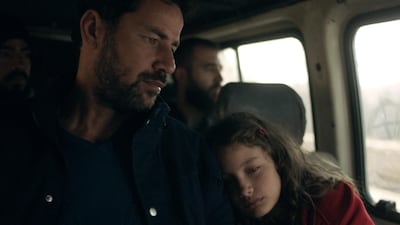Palestinian-British director Farah Nabulsi's short film The Present will be streaming on Netflix on Thursday following its Oscar nomination earlier this week.
One of only two Arab filmmakers, both women, who were nominated for this year's Academy Awards, Nabulsi told The National she saw this as a huge leap forward for diversity and representation.
"As a female and as someone of Arab-Palestinian heritage, it seems to be an exciting time for all Palestinians, ethnic minorities, the Arab world, women in film, those suffering discrimination and so on, to have a film like The Present reach this critical acclaim."
The film, whose distribution rights have been acquired by Front Row Filmed Entertainment, will be available globally on the streaming service, with the exception of France, Japan and a number of countries in Africa.
The Present tells the story of Yousef, played by prominent Palestinian actor Saleh Bakri, who sets out to the West Bank with his young daughter to buy a gift for his wife. However, in a sobering tale of the day-to-day challenges and degradation endured under Israeli occupation, the task of shopping for the gift is made almost impossible.
The film, which is competing in the Oscars' Live Action Short Film category, has also been shortlisted for a Bafta in the British Short Film category and been nominated for more than 40 international awards.
Making her directorial debut, Nabulsi said she was happy the film had made such a powerful impact globally.
"I'm also so glad that a story that holds such important present day human relevance is resonating with people," she said. "That tells me we are at a precious time in history, along with the Black Lives Matter movement and so on, for a world crying out for an end to all racism and discrimination – and that is absolutely fantastic."
The film, co-written and edited by Palestinian filmmaker and poet Hind Shoufani, was shot over six days in the Palestinian territories.
Speaking of her "amazement" at the film's nomination, Shoufani told The National she was proud to be a part of such a brave film.
"It is also impossible to not feel giddy that something that I created in my home during the writing and editing process has made it to the Baftas and the Oscars. Mainly I am thrilled for all Palestinian artists who might feel propelled by this, challenged and excited and encouraged."
While Shoufani can’t say if the film will translate into change on the ground, like Nabulsi, she longs for it nevertheless.
"I know Farah is a strong believer in the power of human stories to move hearts and minds, and I do think the film's success will educate some, inform others, move many to cry and arm them with knowledge about the daily challenges of being a Palestinian," said Shoufani.
Having more than exceeded expectations on the awards circuit, Nabulsi admitted it was bittersweet to have been nominated for the industry’s biggest awards at a time of muted celebrations.
"Most of it has taken place from my living room couch, due to Covid-19, but in the bigger scheme of things, I really can't complain. As a filmmaker, I'm so grateful for the reception the film has been receiving from both audiences and juries around the world," Nabulsi told The National.
The Baftas has already announced that its awards ceremony will be entirely virtual, and while the Oscars are still expected to go ahead, Nabulsi doesn't see her crew jetting around together to pick up their gongs just yet.
“As a child, I never dreamt of reaching these awards ceremonies as a nominee but I’m pretty sure if I had, this wasn’t the way it was going down.”


